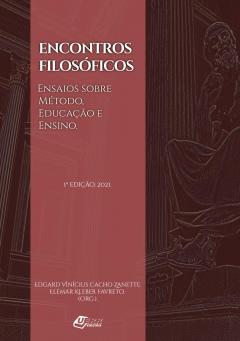Philosophical Encounters: Essays on Method, Education and Teaching
Keywords:
Philosophy, Essays, CollectionSynopsis
The sciences, arts and philosophy have different methodological and epistemological perspectives about the world, however, they seek to express the same phenomena and objects, giving meaning to things and to man himself in this process. The relationship between these diverse perspectives can generate new conceptions of the world, more committed to understanding the whole and its relationship with the parts, and not just a tiny and specific compartment of the universe.
Interdisciplinarity, therefore, moves the entire process of meeting knowledge, generating new questions and new proposals for investigating the things of the world. Philosophy can be thought of as a guide for this interdisciplinarity, given its nature of seeking to understand the whole, but it should not be considered the only way to approach problems. Philosophical concepts, scientific functions and artistic affects / perceptions complement each other in the generation of a broader sense for phenomena, increasingly improving our relationship with the world, with the other and with ourselves.
This work is a collection of texts and essays produced by professors and students of the Undergraduate Program in Philosophy and the Lato Sensu Graduate Program in Fundamentals of Philosophy: Content and Method, from the State University of Roraima (UERR), the result of their research in various areas. of knowledge that, in one way or another, are intertwined with one or more philosophical interpretations. The main themes addressed here, however, are: method, education and teaching. The work is divided into five chapters, the first three on method, methodology and epistemology, and the last two on education in general and teaching philosophy.
We would like to register our thanks to the professors and students of the Graduate Program in Philosophy and the Graduate Program in Fundamentals of Philosophy: Content and Method at the State University of Roraima, who collaborated, in one way or another, for the production of this work. We would also like to thank Editora and the Management of the State University of Roraima for their support in the development of this project.
Chapters
-
The change in the way of conceiving science from Karl Popper's hypothetical deductive method
-
The concept of truth in the epistemology of Karl Popper and Thomas Kuhn
-
Paul Feyerabend's Theoretical AnarchismScience's Contributions to a More Democratic Society
-
Philosophy teaching and curriculum in BrazilA Reflection on the Contribution of Philosophy to Education
-
Philosophy in High SchoolPhilosophical Practice as a Contemporary Action
Downloads



